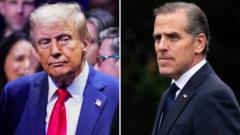In a striking reflection of America's divisive political climate, both President Joe Biden and former President Donald Trump have found themselves entangled in high-profile legal matters that, while differing in specifics, resonate with similar themes of perceived injustice. In a recent announcement, Biden issued a "full and unconditional" pardon to his son, Hunter Biden, asserting that the prosecution was a politically motivated attack. "No reasonable person who looks at the facts of Hunter’s cases can reach any other conclusion than Hunter was singled out only because he is my son – and that is wrong," he stated, mirroring the rhetoric often used by Trump regarding his own legal battles.
Trump, who faced conviction over hush-money payments made in 2016 to adult film star Stormy Daniels, has consistently decried what he labels as "selective prosecution." His legal team recently highlighted the similarities between their cases, arguing that Biden's stance on his son's prosecution underscores a broader injustice in the judicial system. Trump's confidante, Republican Senator Lindsey Graham, characterized the New York trial as an "outrage," further solidifying claims of a politically manipulated legal process.
Both Biden's and Trump’s situations emerged in the public arena in 2024, several years after the incidents in question, attracting scrutiny and claims of legal overreach from both parties. The cases show striking parallels: Biden's alleged misconduct over gun applications and taxes paralleled Trump’s campaign finance violations, demonstrating unconventional applications of the law in each scenario. Critics have pointed out that both prosecutions seem to emerge from political motivations rather than straightforward legal reasons.
Nonetheless, commentators note the differences within these cases. Unlike Trump, Hunter Biden does not have a record of holding public office, and the ramifications of their respective cases differ widely. Trump faces multiple criminal charges, whereas Hunter, through presidential pardon, is shielded from further consequences. Yet, both have sparked discussions about the influence of politics within prosecutorial decisions, fueling a narrative that suggests a double standard, especially among wealthy and powerful figures.
This narrative fosters a growing skepticism among the public regarding the fairness of the U.S. legal system, evidenced by a notable lack of faith in political institutions. Political science experts suggest that public distrust of the system feeds claims of political favoritism and selective prosecution made by both Biden and Trump.
As the cases unfold, they not only highlight personal struggles but also reflect on a deep-seated crisis of faith in government institutions, with each politician shaping their rhetoric to resonate with a public weary of perceived injustice. Biden leveraging Trump-like defenses might additionally serve to boost public support in an era where political legitimacy is increasingly questioned, thus redefining the discourse around the overarching issues at stake in American democracy.
Trump, who faced conviction over hush-money payments made in 2016 to adult film star Stormy Daniels, has consistently decried what he labels as "selective prosecution." His legal team recently highlighted the similarities between their cases, arguing that Biden's stance on his son's prosecution underscores a broader injustice in the judicial system. Trump's confidante, Republican Senator Lindsey Graham, characterized the New York trial as an "outrage," further solidifying claims of a politically manipulated legal process.
Both Biden's and Trump’s situations emerged in the public arena in 2024, several years after the incidents in question, attracting scrutiny and claims of legal overreach from both parties. The cases show striking parallels: Biden's alleged misconduct over gun applications and taxes paralleled Trump’s campaign finance violations, demonstrating unconventional applications of the law in each scenario. Critics have pointed out that both prosecutions seem to emerge from political motivations rather than straightforward legal reasons.
Nonetheless, commentators note the differences within these cases. Unlike Trump, Hunter Biden does not have a record of holding public office, and the ramifications of their respective cases differ widely. Trump faces multiple criminal charges, whereas Hunter, through presidential pardon, is shielded from further consequences. Yet, both have sparked discussions about the influence of politics within prosecutorial decisions, fueling a narrative that suggests a double standard, especially among wealthy and powerful figures.
This narrative fosters a growing skepticism among the public regarding the fairness of the U.S. legal system, evidenced by a notable lack of faith in political institutions. Political science experts suggest that public distrust of the system feeds claims of political favoritism and selective prosecution made by both Biden and Trump.
As the cases unfold, they not only highlight personal struggles but also reflect on a deep-seated crisis of faith in government institutions, with each politician shaping their rhetoric to resonate with a public weary of perceived injustice. Biden leveraging Trump-like defenses might additionally serve to boost public support in an era where political legitimacy is increasingly questioned, thus redefining the discourse around the overarching issues at stake in American democracy.





















